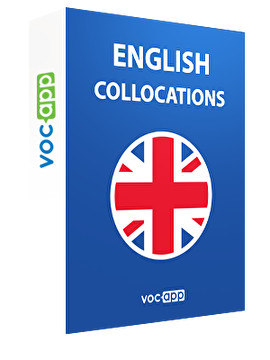


English Collocations
Want to form more natural English sentences? Then this course is for you!
 | Collocations with the verb "to break" 45 flashcards |  | Collocations with the verb "to catch" 27 flashcards |  | Collocations with the verb "to come" 50 flashcards |
 | Collocations with the verb "to do" 55 flashcards |  | Collocations with the verb "to get" 54 flashcards |  | Collocations with the verb "to give" 49 flashcards |
 | Collocations with the verb "to go" 63 flashcards |  | Collocations with the verb "to have" 40 flashcards | Show all lessons (37) | |
If you are not satisfied with the product you have bought, contact us and we will reimburse your money.
Marcin Młodzki, board member(Warsaw, 1st Oct 2018)
VocApp Sp. z o.o.
ul. Mielczarskiego 8/58 | 02-798 Warszawa
TAX NUMBER: PL 951 245 79 19
Address
VocApp Sp. z o.o.ul. Mielczarskiego 8/58
02-798 Warszawa
NIP: 951 245 79 19
REGON: 369727696
English idiomsEnglish pronunciationAcademic Word ListTop 1000 English WordsSynonyms for most overused English wordsAmerican slangBritish slangEnglish CollocationsPhrasal VerbsInternational PoliticsCockneyMarketing vocabularyTop 100 Phrasal VerbsPhotography termsWho said that? - top 100 movie quotations in American cinemaAdvanced English: C1&C2 levelTOEFL - Most important wordsIELTS Speaking Exam
English collocations
In English, collocation refers to a natural combination of words closely related to one another. Some examples are "to take a risk," "to do homework " and "to give someone advice." Collocations make it easier to avoid overused or ambiguous words such as "very," "nice" or "beautiful" by using a pair of words that better fit the context and have a more accurate meaning. Skilled language users can bring about effects such as humour by varying the normal collocation patterns. The approach is particularly popular among poets, journalists and advertisers.
Difference between phrasal verbs and collocations
In the sentence, a collocation can perform various functions (i.e. act as different parts of the speech). Usually, a phrasal verb is a combination of a verb + a preposition that usually changes the meaning of the original verb. So that is better to memorize phrasal verbs than just learning the definition of the verbs, and then the prepositions separately. To learn phrasal verbs, you can check out the Phrasal Verbs course on our website.
Start learning English collocations
A lot of people who were studying English spent many hours to learn thousands of words of vocabulary. By studying something from a dictionary, they grasp the context of the term, but in the end, they always have difficulty utilizing the word in a sentence. Do not let collocations intimidate you. Let’s start to learn with the English collocations course. This course is going to help you to use collocations in your sentences correctly and make you sound like a native speaker.
Before you start to learn English collocations we would recommend you to improve also your vocabulary. For that, you can check our Top 1000 English Words course. Have a good time studying!



